Alfred Charles Glyn Egerton facts for kids
Quick facts for kids
Alfred Charles Glyn Egerton
|
|
|---|---|

1932 portrait by Walter Stoneman
|
|
| Born | 11 October 1886 Glyn Cywarch, near Talsarnau, Gwynedd, Wales
|
| Died | 7 September 1959 (aged 72) Mouans-Sartoux, France
|
| Nationality | British |
| Alma mater | University College, London |
| Known for | Liquid methane |
| Awards | Rumford Medal (1946) |
| Scientific career | |
| Fields | Chemistry |
| Institutions | Royal Military Academy, Woolwich Clarendon Laboratory Imperial College of Science |
Sir Alfred Charles Glyn Egerton (born October 11, 1886 – died September 7, 1959) was a brilliant British chemist. He was known for his important work on explosives during World War I. Later, he became a pioneer in studying how things burn, a process called combustion. He even helped develop liquid methane as a new type of fuel. His contributions earned him the title of FRS, which is a big honor for scientists.
Contents
Early Life and Education
Alfred Egerton was born in a place called Glyn Cywarch in Wales on October 11, 1886. He was the fourth son in his family. His father was a military officer, and his mother came from a well-known family.
He went to Eton College, a famous school, starting in 1900. After Eton, he studied chemistry at University College, London. He was a very good student and graduated with top honors in 1908. He then continued his studies in France before becoming an instructor at the Royal Military Academy, Woolwich. There, he researched nitrogen oxides, which are important chemical compounds.
A Career in Chemistry
In 1913, Egerton went to Germany to work with a famous scientist named Walther Nernst. He also became good friends with another scientist, Frederick Lindemann. When World War I started in 1914, Nernst helped Egerton and his wife return safely to England.
World War I Contributions
Even though he joined the army, Egerton was soon asked to help with the war effort in a different way. He worked for the Department of Explosives Supply. His job was to help design and build factories that made explosives for the war. This was very important during the Shell Crisis of 1915, when Britain needed more munitions. He also studied how to make synthetic ammonia, a key ingredient for explosives and fertilizers.
After the war, he visited Germany to learn about their chemical industry. He discovered how they made huge amounts of synthetic ammonia using a process called the Haber process.
Research on Combustion
Later in 1919, Egerton joined the Clarendon Laboratory at Oxford University. He first studied the vapour pressure of different metals. This research helped scientists understand how metals behave when heated.
However, his main interest soon shifted to combustion, which is the scientific word for burning. He wanted to understand why car engines sometimes made a knocking sound. He studied how flames spread and how different chemicals burn. To do this, he even created a special burner that made a steady flame, allowing him to examine its properties closely.
Important Roles and Honors
Egerton was recognized for his important work. He became a fellow of the Royal Society in 1925. This is one of the highest honors for scientists in the UK. He also served on many important committees, helping to guide scientific research in Britain.
In 1936, he became a professor at the Imperial College of Science. During World War II, he did groundbreaking work on using liquid methane as a fuel for vehicles. He even tested it on a bus route! He also advised the government on scientific matters during the war.
In 1943, he was sent to Washington, D.C., to improve scientific connections between Britain and the United States. He did a great job, building strong relationships with American scientists. For all his services, he was knighted in 1943, becoming Sir Alfred Egerton. He also received the Rumford Medal in 1946 for his outstanding work in science.
Family Life
In 1912, Alfred Egerton married Ruth Julia Cripps. They did not have their own children but adopted a nephew.
Later Life and Legacy
Sir Alfred Egerton retired from Imperial College in 1952. He continued to publish scientific papers even after retirement. He passed away on September 7, 1959, in France. His scientific papers and letters are kept in various archives, helping future scientists learn from his work.

